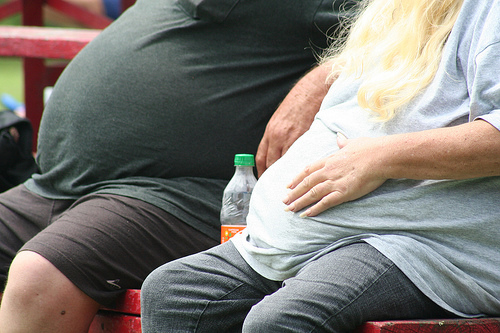Aging brings with it a host of bodily changes. Some of these include gray hair, wrinkles, stiff joints, and yes, often, more body fat. Many changes, like gray hair and even a moderate amount of wrinkles, are inevitable due to the aging process. However, your lifestyle can also influence how much weight you gain as you age and how other bodily processes change as you get older.
As we get older, the amount and distribution of body fat, lean muscle mass, bones and water will change. Fat tends to gather towards the body’s center, especially around the abdominal organs. Body fat can increase by 30% or more due to aging processes.
This change in body fat amount also decreases our amount of lean muscle mass. Muscles, as well as other organs in the body, can lose cells as we age, called atrophy. Bones, too, lose minerals and become less dense. Loss of bodily tissue also decreases the amount of water found in the body as we age.
In addition to gaining fat, losing muscle, losing bone density, and losing water, many people lose height as they age. It has been estimated that people lose up to a half inch of height every decade after they turn 40. After age 70, you can lose up to three inches of height! Height can affect weight distribution as we age as well.
Men might gain weight until they reach the age of 55, when testosterone levels drop and they start losing weight. Women often gain weight until they are 65, then lose weight due to losing muscle tissue.
As older people lose body water, they can become dehydrated more easily. Medication might need adjusted, and more water needs to be drank daily, as we age. Loss of muscle mass can also cause older people to get off balance easily and fall.
These changes are not totally inevitable as we age, however. The proper diet and getting enough exercise can help combat these “normal” changes of aging. Avoiding smoking, cutting down on alcohol, and not using drugs can also help to slow down age-related changes.
Eating a healthy diet that contains foods from all four food groups each day can help to reduce the affects of aging on the body. Getting enough water, ideally at least 64 ounces per day, is important as well. Exercise becomes even more important as we age, but make sure you build up — dont’ try to run a marathon on your first day of exercise. If you’re 55 or older, it’s best to see your physician before beginning any exercise program to make sure you’re cleared for increased physical activity.
Growing old does not mean that you are destined to have a pot belly, thin sticklike arms and legs, and will have a hunchback. How you lead your life now and into your golden years can affect how you age. It is possible to age gracefully with the right diet, exercise, and moderation in everything you do.












